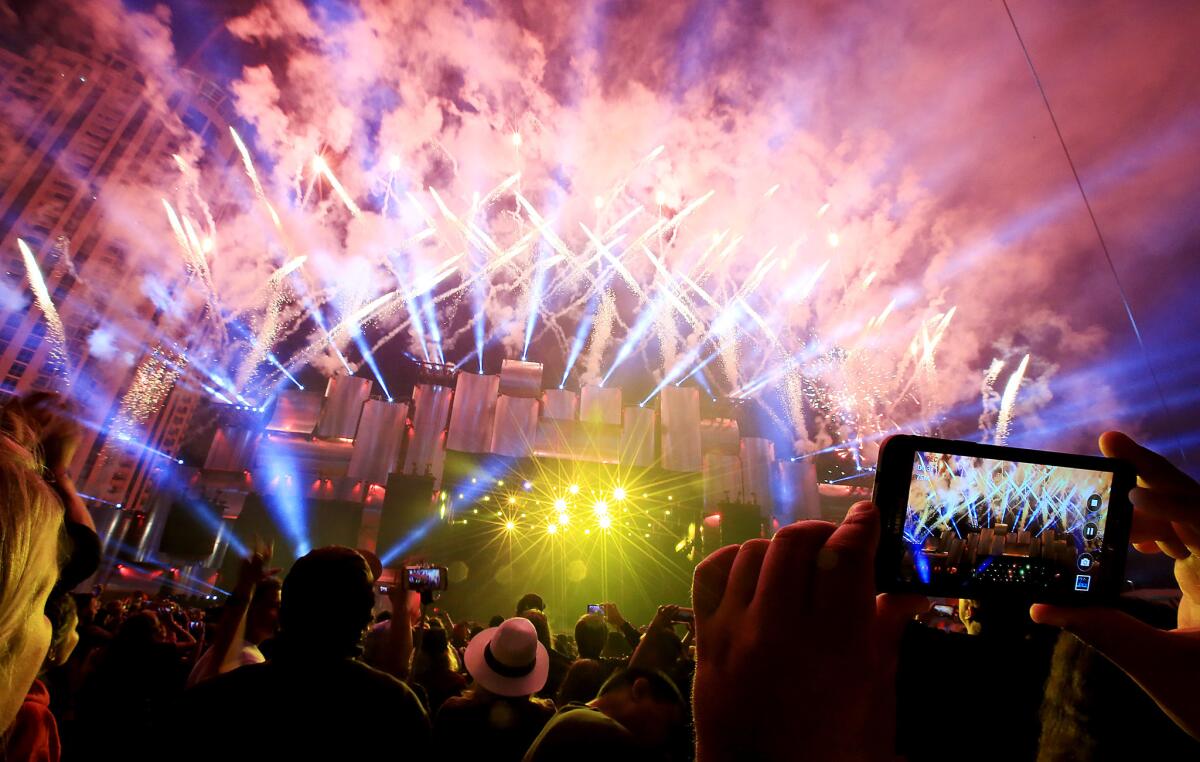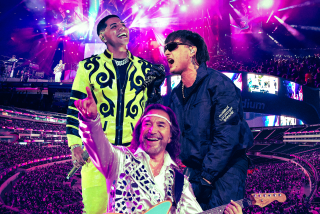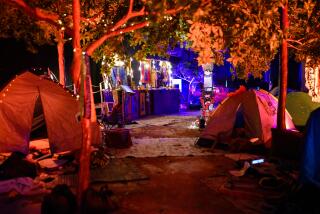Rock in Rio debuts in Las Vegas to 82,000 fans: Did it deliver?

Music fans take in a late-night fireworks show at
Reporting from Las Vegas — Rock in Rio made it in South America and Europe. But how did the decades-old music festival fare in America?
For more than a year, organizers promised the Brazilian-born festival would not only make a major splash in a landscape packed with well-oiled multi-day offerings (Coachella Valley Music and Arts Festival, et al.) but also bring fresh energy to the Las Vegas Strip, where entertainment options are 24/7.
The inaugural weekend, which wrapped Saturday night, attracted 82,000 attendees to its first two days of concerts, rides and street performers on a site dubbed the “City of Rock.”
Metallica, No Doubt, Maná, Linkin Park, Foster the People, Gary Clark Jr., Deftones, Hollywood Undead, Coheed and Cambria, Of Mice and Men and Sepultura featuring Steve Vai were major draws.
Although the festival’s opening weekend attracted less than half of the two-day capacity of 170,000, those who arrived at the City of Rock found plenty of action beyond music.
Festival-goers sliced across the sky on a zip line that zoomed over the crowd and the main stage, and themed “Rock Streets” tapped into the cultures of America, the United Kingdom and Brazil.
Brazilian capoeira drummers led dance parties. Hip-hop dancers impressed onlookers with their sleek moves. Irish cloggers were part of rapturous late-night revelry. Street performers juggled, hula-hooped and walked on stilts to the amazement of onlookers.
Bars poured handcrafted Scotch whiskey cocktails or, keeping with the Vegas theme, offered massive drinks inside souvenir instruments. There were shops offering everything from clothing to simulated hang gliding.
There was even a neon-lighted chapel where a handful of love-struck couples tied the knot alongside an Elvis impersonator (it’s been a tradition at the Rio festival).
The action was spread across 40 acres on a newly constructed, $25-million site at the northern end of the Strip that boasted festival rarities such as permanent electrical, water and sewage infrastructure.
“Going to a new country, especially one as important as the U.S., we were afraid people might not like it,” festival founder Roberto Medina said in his office lounge in the site’s posh VIP structure as Linkin Park could be heard from the main stage. “That was the biggest challenge. But people liked it … and I believe the city is happy. I’m fulfilled.”
Rock in Rio “is not just to see the artists, it’s an experience,” he continued, speaking in Portuguese through an interpreter. “And we delivered. I’m very relieved to have been able to deliver what I had dreamt in such a large country. This is a steppingstone for future editions and the U.S. was essential.”
The weekend wasn’t without minor hiccups, though.
Before the festival hit its stride Friday night, first-day jitters were apparent all over the grounds during much of the afternoon, making for a frustrating opening.
Logistics were a challenge. Cab drivers were unaware of where to drop off passengers, and shuttles didn’t appear when or where advertised.
Security, however, was overly efficient, making lines to enter virtually nonexistent, and the longest lines throughout the weekend were attendees getting their IDs checked so they would be able to drink.
Although the simple layout made for easy navigation, festival-goers who forgot to download the app that contained set times were lost; times weren’t posted throughout festival grounds.
And despite much advertising, many seemed to be unaware of the festival’s no-cash, no-credit-card policy. Attendees were required to load funds on their wristbands, either online or at one of the numerous “Top-Up Stations” on site, but a number of the stations were out of service on opening day.
Those hiccups understandably left organizers nervous throughout much of the festival’s start.
“The first hours are intense,” Roberta Medina, vice president of Rock in Rio, admitted midway through Day 1. “You get anxious, you don’t know how people will react.”
Roberta, the daughter of Brazilian media and advertising entrepreneur and festival founder Roberto Medina, spent Friday looking for places that needed fine-tuning.
She said they have already looked ahead to next weekend -- it boasts a pop-leaning lineup including Taylor Swift, Bruno Mars, John Legend, Ed Sheeran, Joss Stone and Jessie J -- to see where they can improve.
Minor glitches aside -- there were no reports of major incidents during the weekend -- the festival worked hard to impress.
Rapper Theophilus London made for a solid late-minute replacement for Bleachers, after frontman Jack Antonoff was forced to pull out a few days prior because of a death in the family, and organizers are working to fill Sam Smith’s slot for next weekend since the British singer canceled a spate of gigs after a vocal hemorrhage.
But those quirks were hardly felt on site.
“It’s way more organized than I thought it was going to be,” said Angelica Govaert, one of hundreds of nearby residents given free day passes (a rep said it was a way for organizers to thank neighbors for the impact). “But anything can work if you put enough money into it. And that’s the story of Las Vegas -- just throw money at it.”
Times staff writer Randall Roberts contributed to this report.
For more music news follow me on Twitter: @gerrickkennedy
More to Read
The biggest entertainment stories
Get our big stories about Hollywood, film, television, music, arts, culture and more right in your inbox as soon as they publish.
You may occasionally receive promotional content from the Los Angeles Times.











